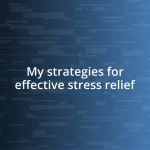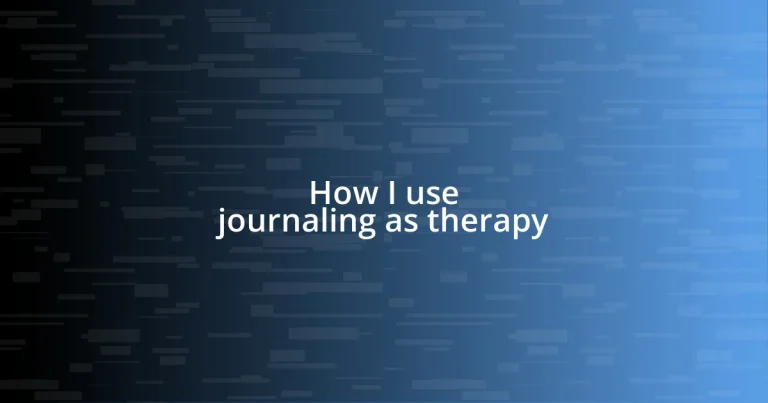Key takeaways:
- Journaling facilitates self-reflection and emotional clarity, transforming chaotic thoughts into structured understanding.
- Establishing a consistent journaling routine in a calm, inviting environment enhances the therapeutic benefits of writing.
- Using prompts can guide introspection and help track personal growth, while reflecting on past entries fosters deeper insights into emotional evolution.
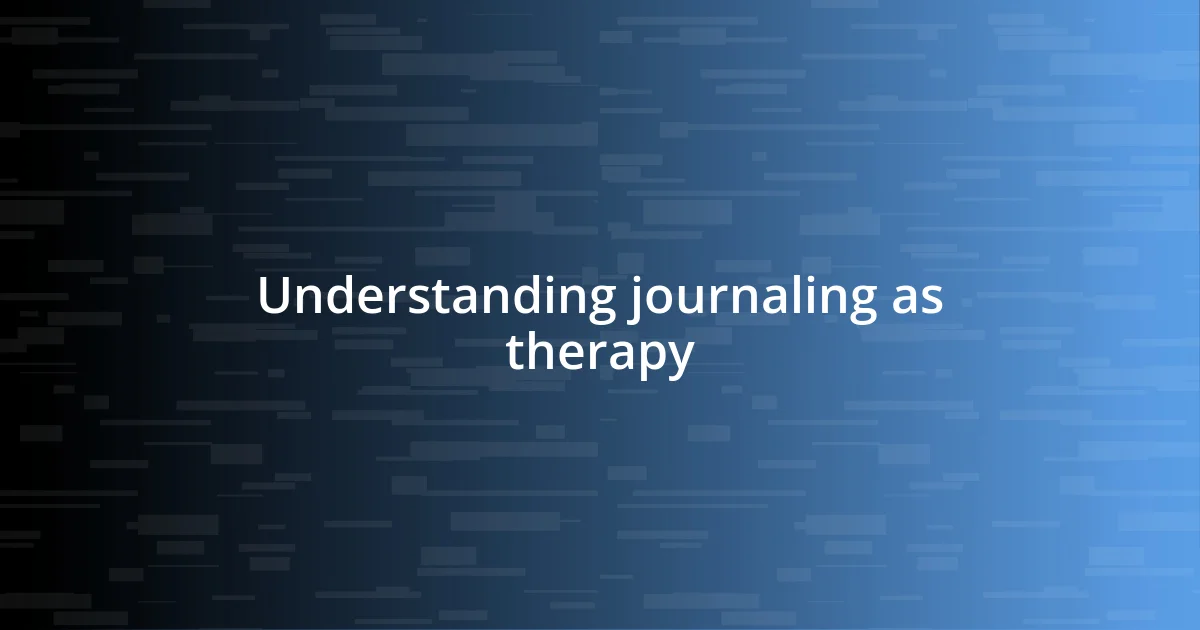
Understanding journaling as therapy
Journaling as therapy offers a unique space for self-reflection and emotional clarity. I remember a time when my thoughts felt like a chaotic whirlwind, and writing everything down helped me uncover patterns in my emotions. Have you ever felt a sense of relief after expressing your thoughts on paper? It’s like lifting a weight off your chest.
Many people don’t realize that journaling allows us to process experiences by giving them a narrative structure. For instance, when I write about a challenging day, I often find that recounting the events helps me step back and analyze my feelings more critically. Could it be that seeing our thoughts written down allows us to distance ourselves from them, leading to clearer perspectives?
Moreover, the act of journaling is inherently therapeutic because it taps into our innate desire to communicate and understand ourselves better. I’ve found that even on days when I struggle to articulate my feelings in conversation, writing provides a comforting outlet. Do you also find that writing down your worries can lead to unexpected insights? It’s a powerful tool that transforms seemingly jumbled thoughts into structured understanding.

Choosing the right journaling method
Choosing the right journaling method can significantly impact your therapeutic experience. Personally, I’ve experimented with various approaches, from free writing to structured prompts. I often find that the method I choose can influence my mood and clarity; for instance, when using guided prompts, I sometimes uncover deeper layers of my thoughts that I hadn’t considered before.
Here are a few methods to consider when selecting a journaling approach:
- Free Writing: Pour your thoughts onto the page without worrying about structure. I’ve found this to be liberating, especially on hectic days when my mind feels cluttered.
- Bullet Journaling: Combine time management and reflection. This method works for me when I want to track my moods alongside my tasks.
- Gratitude Journals: Focus on positive experiences. I remember days when listing what I’m thankful for boosted my spirits remarkably.
- Art Journaling: Incorporate drawings or collages. I’ve dabbled in this, finding it a delightful creative outlet, especially when words don’t seem sufficient.
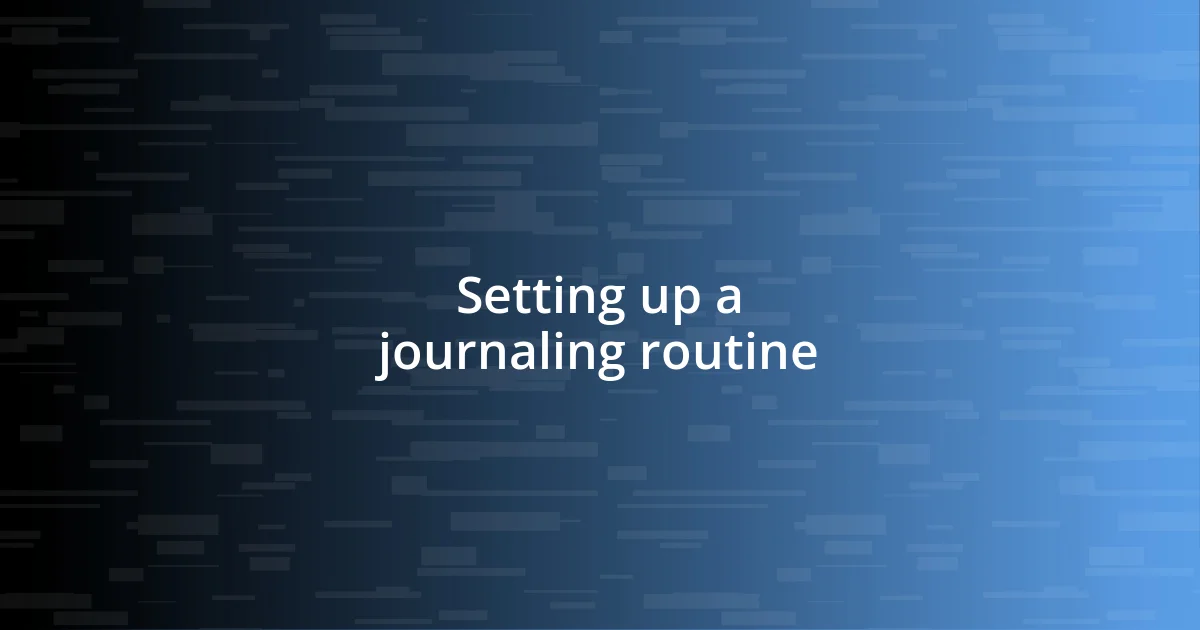
Setting up a journaling routine
Setting up a journaling routine is key to reaping its therapeutic benefits. For me, consistency is the magic ingredient. I typically set aside a dedicated time each day, often in the morning, when my mind is still fresh. This approach not only fosters a habit but also ensures that I remain committed to my emotional processing. Have you noticed how a regular routine can transform your creativity?
Finding the right space is also crucial. I prefer a cozy nook in my home where I feel safe and undistracted. I remember trying to journal in noisy coffee shops, but I often ended up feeling more anxious than reflective. It’s essential to create an environment that resonates with calmness. What about you? Do you have a special spot that makes journaling feel more inviting?
Lastly, I recommend keeping your journaling materials ready and accessible. I always have my favorite pen and notebook nearby, making it easier to dive into my thoughts whenever they arise. This tiny preparation makes a difference, turning a fleeting thought into a written reflection. Have you ever experienced the joy of capturing an epiphany before it slips away?
| Factors | My Experience |
|---|---|
| Consistency | Journaling daily in the morning strengthens my routine. |
| Environment | A cozy, quiet spot enhances my reflective process. |
| Accessibility | Keeping materials handy allows me to write anytime inspiration strikes. |
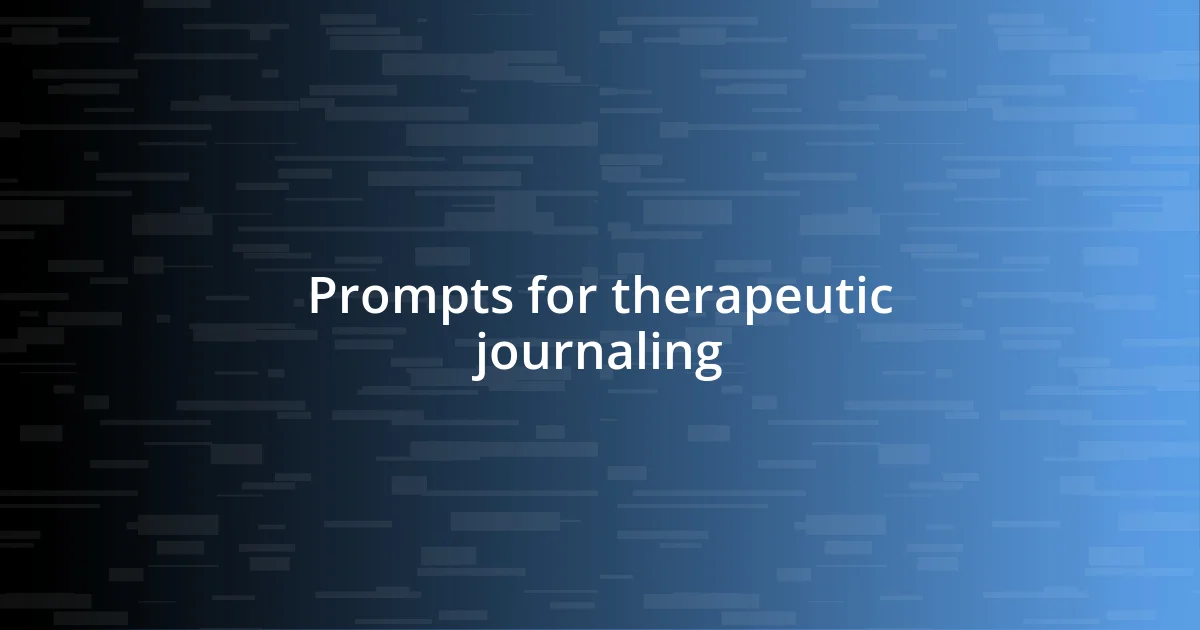
Prompts for therapeutic journaling
Prompts for therapeutic journaling can serve as a guiding light during moments of introspection. One prompt I often return to is, “What emotions am I feeling right now, and why?” This simple yet powerful question helps me untangle complex feelings and understand the underlying causes. Reflecting on my emotions can be a revealing experience; sometimes, I’m surprised by what emerges from my thoughts.
Another prompt that resonates with me is, “What is my biggest fear, and what steps can I take to confront it?” I vividly recall a time when I wrote about my fear of failure. The act of putting it down on paper helped me break it apart and realize it wasn’t insurmountable. Have you ever noticed how naming a fear, rather than letting it linger in the shadows, can diminish its power over you?
Additionally, I find prompts like “List three things I learned about myself this week” to be incredibly empowering. This practice fosters a sense of growth, reminding me of the progress I’ve made, even in small ways. I once wrote about embracing vulnerability after opening up to a friend. That revelation felt like a weight lifting off my shoulders. Engaging with these prompts keeps me grounded while allowing for personal exploration, and I encourage you to dive into similar reflections. What insights might you uncover about yourself today?
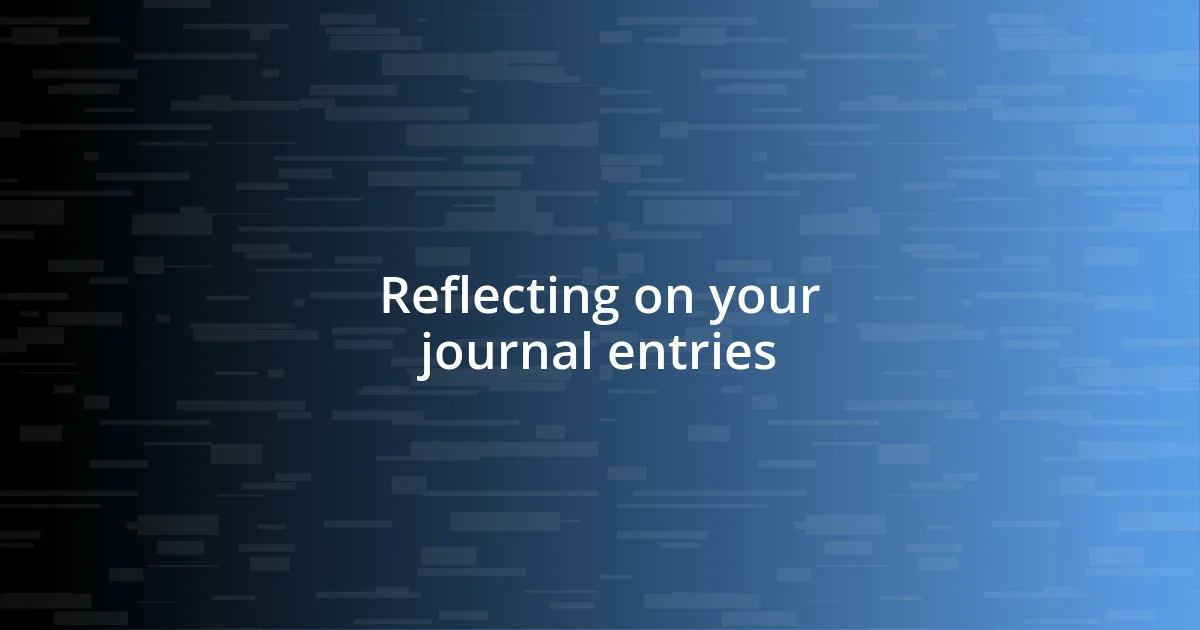
Reflecting on your journal entries
Reflecting on my journal entries is an illuminating process. I often find myself revisiting old pages and discovering patterns I hadn’t noticed before. Like the time I realized that entries from a particular month were filled with self-doubt, while the following month showcased newfound confidence. It’s fascinating how these snapshots of my emotional evolution can guide my growth. Have you ever looked back and noticed the changes in your mindset over time?
Sometimes, I take a moment to analyze specific themes within my entries. For example, I’ve kept an eye on my recurring worries about relationships. It surprises me how those concerns shifted; what once felt overwhelming now seems manageable. Reflecting in this way not only grants clarity but also allows me to celebrate progress. When was the last time you celebrated your own growth through self-reflection?
I often jot down notes next to my entries, adding insights or questions after a few days have passed. This practice has become akin to having a conversation with my past self, where I can gently probe into my thought processes. I remember writing about a difficult breakup, then later adding a simple note: “What did you learn from this?” It’s powerful to engage in a dialogue with my own emotions, creating space for deeper understanding. What questions do you think would help you navigate your own reflections?
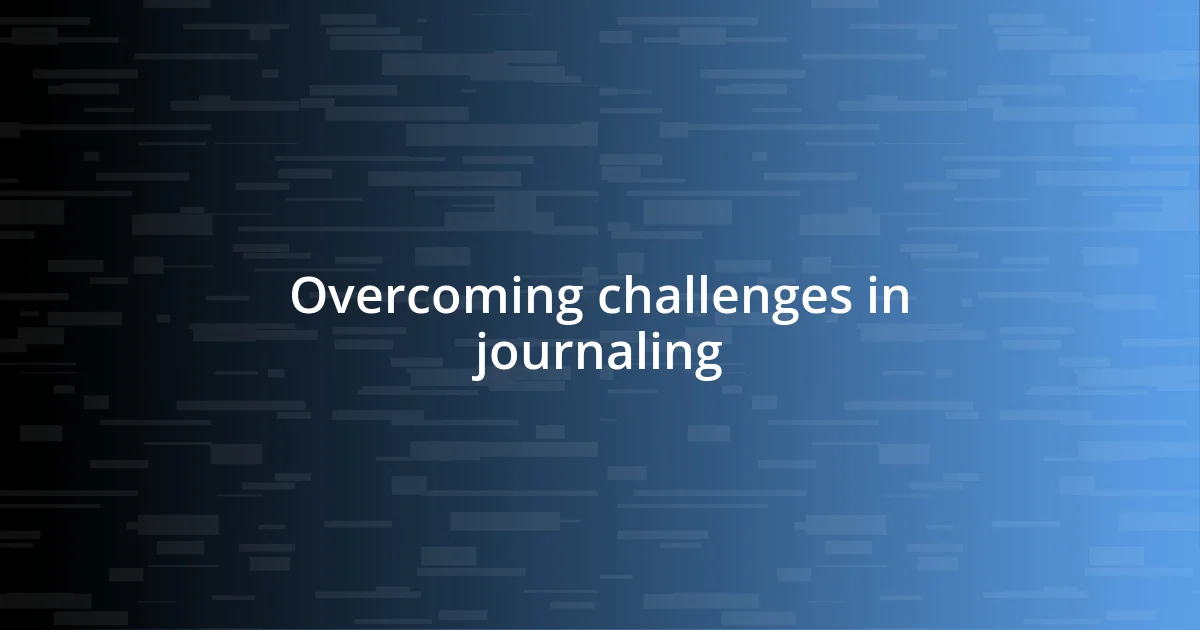
Overcoming challenges in journaling
Overcoming challenges in journaling can be a journey in itself. I recall struggling with consistency—some weeks, the words flowed easily, while other times, my journal sat untouched. To tackle this, I established a routine; I dedicated just ten minutes each morning to write. This small commitment turned into a habit I looked forward to, easing the pressure of perfection.
Another challenge I faced was the fear of judgment. Initially, I worried that someone might read my innermost thoughts. I decided to frame my journal as a private space, reminding myself that this was my sanctuary for exploration. Embracing this mindset turned the act of writing into a liberating experience rather than a source of anxiety. Have you ever found relief by simply giving yourself permission to express freely?
Sometimes, I hit a wall and couldn’t find the right words. In those moments, I turned to free writing—creating a stream of consciousness without worrying about grammar or structure. I remember once writing about a frustrating day, and suddenly, it transformed into an unexpected revelation about my needs. By loosening up, I discovered that my journal had the power to unveil thoughts I didn’t even know were there. What hidden gems might you uncover within your own pages when you let go of expectations?






